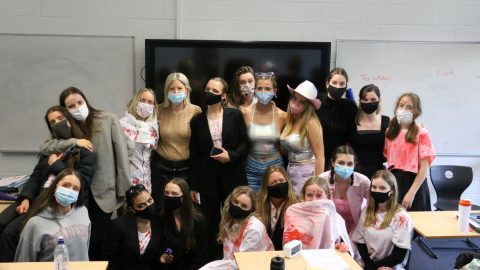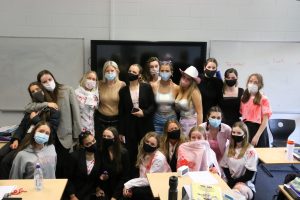English Update – the challenges of 2020 make way for the opportunities of 2021

Last week I accompanied the Year 12 students into their VCE English and EAL exam and a range of emotions ran through me as they walked away from me into the examination room. It has been such a phenomenal year for them all in so many ways and it made me reflect on the challenges this year for the students. It has been an epic journey for them to keep up the motivation in the online space and continue to strive for their goals in this year where nothing has been ‘normal’.
The words of Mark Twain resonate with me, “The secret of getting ahead is getting started. The secret of getting started is breaking your complex overwhelming tasks into small manageable tasks, and then starting on the first one.” We have done a lot of breaking down of tasks throughout the course of this year in English, from rewriting our whole curriculum to online SACs and assessments, to videoing and recording lessons and to a close examination of our teaching methodology and pedagogy. What stands out to me has been our capacity as educators and students to adopt a continuous learning mindset and in this we have all opened ourselves up to the idea of learning and ‘unlearning’. Adopting different approaches to learning that have helped us build adaptive expertise and self-efficacy. The unlearning of the ‘way we have always have done it’ was a necessity to take on during this extraordinary year in education.
In the English Faculty, our philosophy this year has been, “Love challenges, be intrigued by mistakes, enjoy effort and keep on learning.” In other words, apply a growth mindset rather than a fixed mindset to learning. In a growth mindset, challenges are exciting rather than threatening and we embrace a thinking around the view of, ‘we haven’t learnt … yet’. (Dweck, 2013)
In a year where we had no normal in education and everything rapidly changed, teachers and students had to adopt this mindset. If we didn’t we would, quite literally, get left behind and not manage in 2020.
So, I suppose the question is, what’s next? From every challenge comes opportunities and there are many. What we do know is that we need to keep moving forward and offer our students a learning experience that will prepare them for this changed world post school. As educators, it is essential we be future focused, action-oriented, inclusive and empowering in our approach and learning and we need to instil these skills and values into our students. To achieve this, we need to embed reflective enquiry and learning into our teaching practice. (Cummins, 2019)
For me, it has always been about the students and a positive outcome for them. As we shift into 2021 we are now looking for the opportunities to come from the challenges. We need to consider continuous learning as being a flexible online and offline approach in our design, development and delivery of curriculum for all students.
And perhaps, once Term 4 has finished – we can all reflect; parents, students and teachers on the year that was – 2020!
—
References
Dweck, C. S. (2013) Mindset : The New Psychology of Success. Ballantine Books, New York.
Cummins, P. & Di Prato, A. (2019) A School for Tomorrow: Continuous Learning Toolkit



